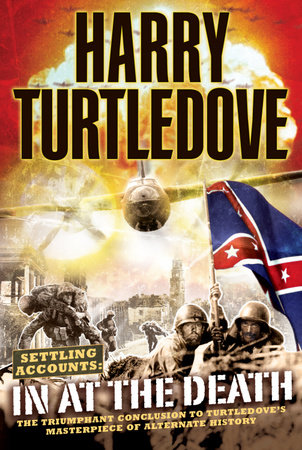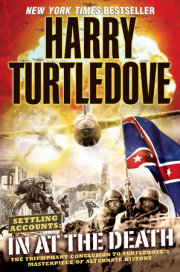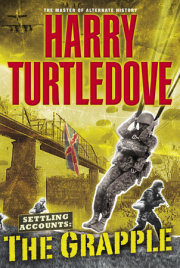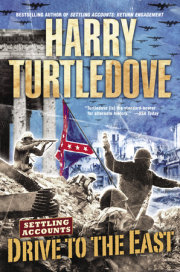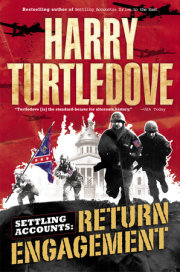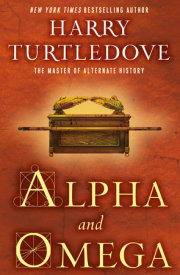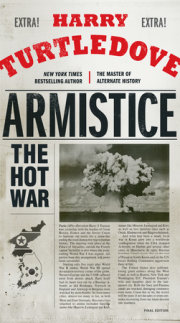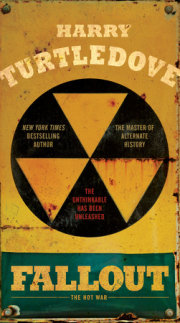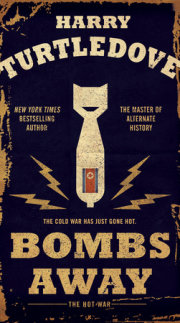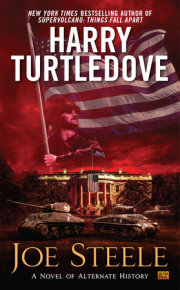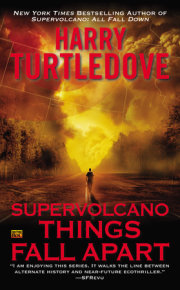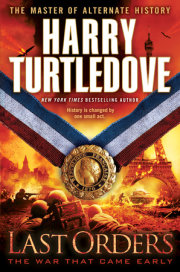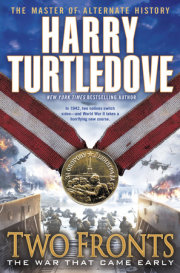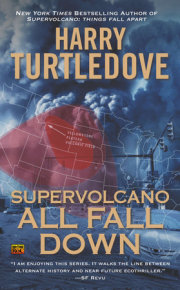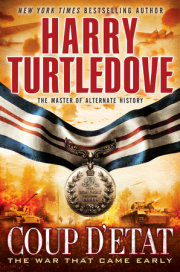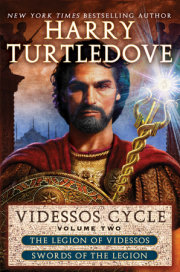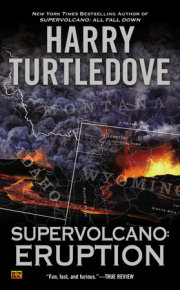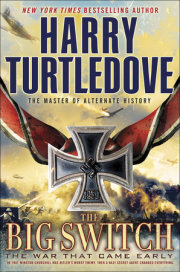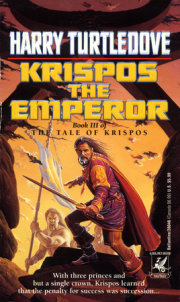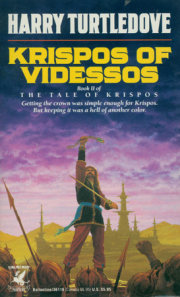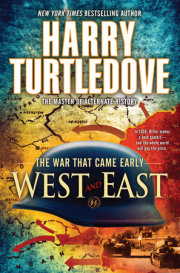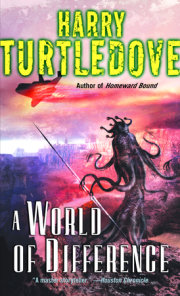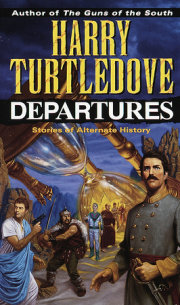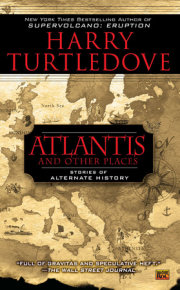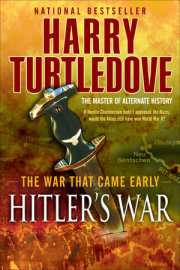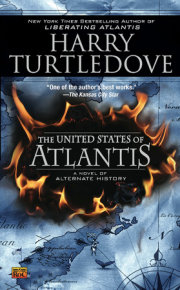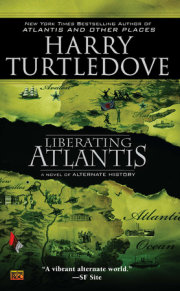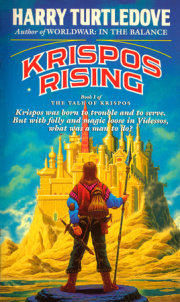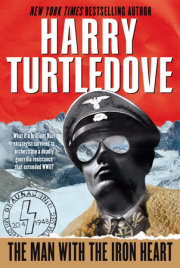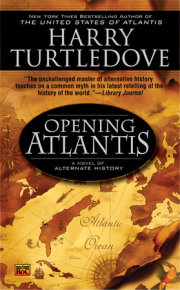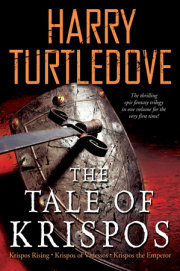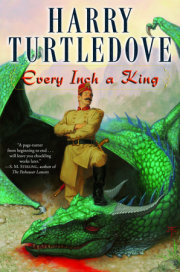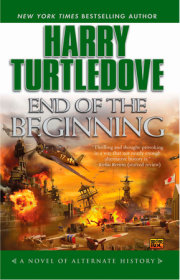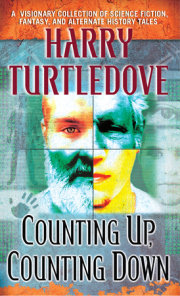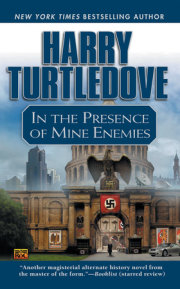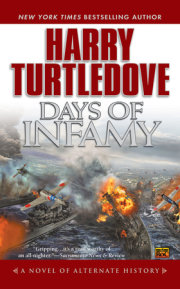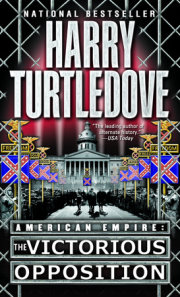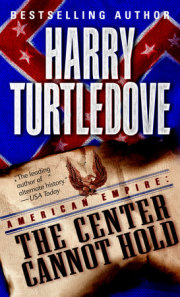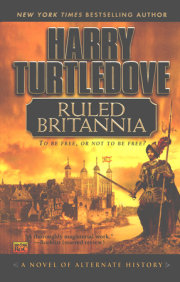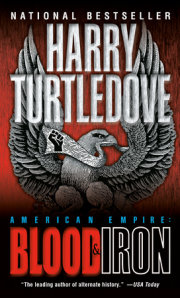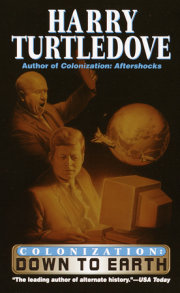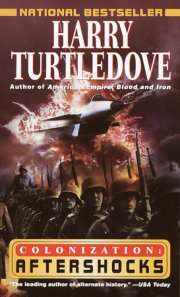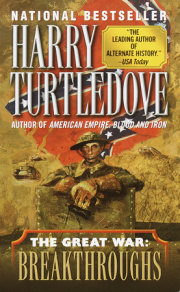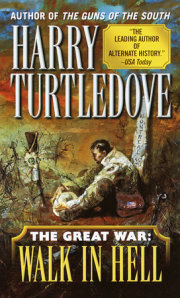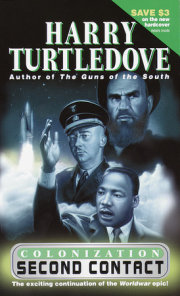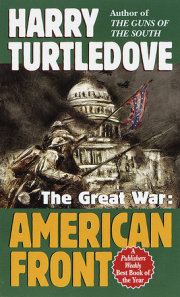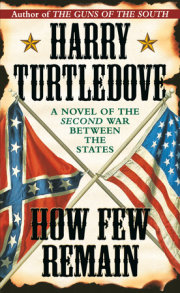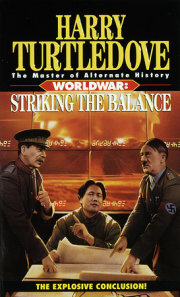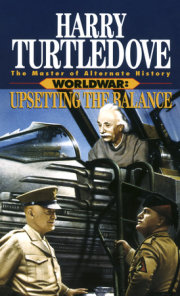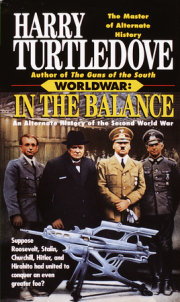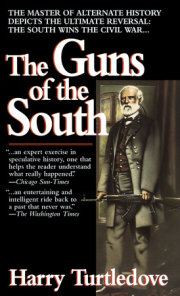Brigadier General Clarence Potter crouched in a muddy trench north of Atlanta. Overhead, U.S. bombers flew through what looked like flak thick enough to walk on. Potter saw smoke coming from a couple of enemy airplanes, but the airplanes went on about the business of pounding the hub of the Confederate States of America flat.
Most of the bombs fell behind Potter, in the heart of Atlanta. As usual, the United States were going after the railroad yards and the factories that made the capital of Georgia so vital to the CSA. As far as Potter could tell, the latest bombardments were overkill. By now, Atlanta’s importance was gone with the wind.
The locals, those who hadn’t refugeed out or been blown sky high, seemed stunned at what had happened to their city. Disasters, to them, were for other places. New Orleans had suffered the indignity of capture in the War of Secession. Louisville had been lost in that war, wrecked in the Second Mexican War, lost again in the Great War, and spent an embarrassing generation as a U.S. city afterwards. Richmond had been battered in the Great War, and was taking it on the chin even harder now. But Atlanta? Atlanta just kept rolling along.
Except it didn’t. Not any more.
Bombs were falling closer now, working their way north. Potter had seen that happen before. The lead airplanes in a formation would put their bombs about where they belonged–or where the bombardiers thought they belonged, anyhow. Bombardiers farther back would use those early explosions as targets. But, being human, the bomber crews didn’t want to hang around any longer than they had to, so they released their bombs a little sooner than they might have. Work that all the way back through a bomber stream, and...
“And I’m liable to get killed by mistake,” Potter muttered. He was in his early sixties, in good hard shape for his age, with iron-gray hair and cold gray eyes behind steel-rimmed spectacles. His specialty was intelligence work, but he commanded a division these days–the Confederacy was running low on capable, or even incapable, line officers. His cynical cast of mind either suited him for the spymaster’s role or came from too many years spent in it. Even he didn’t know which any more.
“General Potter!” a soldier yelled. “You anywhere around, General Potter?” No doubt for his own ears alone, he added, “Where the fuck you at, General Potter?”
“Here I am!” Potter shouted back. Not a bit abashed, the runner dove into the trench with him. “Why are you looking for me?” Potter asked crisply.
“
You’re General Potter?
Our General Potter?” The young soldier didn’t seem convinced despite Potter’s dirty butternut uniform and the wreathed stars on either side of his collar.
“Afraid I am, son.” Potter knew why the runner was dubious, too. “Back before the Great War, I went to college up at Yale. I learned to talk like a damnyankee to fit in, and it stuck. Now quit dicking around. What’s up?”
“Sir, General Patton’s on the telephone, and he needs to talk to you bad,” the kid replied.
“Oh, joy.” Potter had no trouble containing his enthusiasm. No matter what George Patton imagined he needed, Potter knew
he didn’t need to talk to Patton. But Patton commanded an army, not just a division. He headed all the forces trying to keep the USA away from Atlanta. Potter knew damn well he had to render unto Caesar–not that Patton thought Julius Caesar, or anyone else, his equal. “All right. Field telephone still at the same old stand?”
“Uh, yes, sir.”
“Then you stay here. No point getting both of us blasted just because General Patton’s got the galloping fantods.”
“Thank you, sir.” The runner gaped at him.
Potter hardly noticed. He scrambled out of the trench, getting more tomato-soup mud on his uniform. Fall 1943 had been wet.
A good thing, too, he thought.
Without the rain and the mud, the damnyankees’d probably be at the Atlantic, not Atlanta. He knew he exaggerated. He also knew he didn’t exaggerate by as much as he wished he did.
He scuttled over the cratered landscape like a pair of ragged claws.
Who was the crazy Englishman who wrote that poem? He couldn’t come up with the name. Bombs whistled down from above. None did more than rattle his nerves.
The field telephone was only a couple of hundred yards from where he’d sheltered when bombs started falling. The soldier with the ungainly apparatus and batteries on his back huddled in a foxhole. Barring a direct hit, that was fine. Potter wished he hadn’t thought of the qualifier. The operator held out the handpiece to him.
“Thanks,” Potter said, and then yelled, “Potter here!” Field-telephone connections were generally bad, and bombs going off in the background definitely didn’t help.
“Hello, Potter. This is Patton!” The army commander also shouted. No one was likely to mistake his rasping voice for anybody else’s, even over a field telephone. Potter supposed the same was true of his own. That turned out not to be quite true, for Patton went on, “If the damnyankees capture a telephone, they can put on one of their men claiming to be you and talk me out of everything I know.”
“Heh,” Potter said dutifully. He was sick of being suspected and twitted because of the way he talked. “What do you need, sir? The runner said it was urgent.”
“He’s right,” Patton answered. “I’m going to send the corps that your division is half of against the U.S. forces between Marietta and Lawrenceville. You’ll go in by way of Chamblee and Doraville, and cut off the Yankees east of there. Once we drive them out of Lawrenceville or destroy them in place there, we reopen communications from Atlanta to the northeast.”
“Sir, do you really think a one-corps attack will shift the U.S. forces in that area?” Potter tried to ignore the sinking feeling in the pit of his stomach. Patton’s answer to every military problem was to attack. He’d won great triumphs in Ohio and Pennsylvania in 1941 and 1942, but not the one in Pittsburgh that might have knocked the USA out of the war. And his counterattacks against U.S. forces in Kentucky and Tennessee and Georgia this year had cost the Confederate States far more men and matériel than they were worth.
“We need to reopen that route now, General,” Patton replied. “Even if that weren’t obvious to anyone with a map, I have orders from the President.”
What Jake Featherston wanted, Jake Featherston got. The only thing the President of the CSA wanted that he hadn’t got was the one he’d needed most: a short, victorious war. Even getting a war the country could survive didn’t look easy any more.
Speaking carefully, Potter said, “Sir, the Yankees already have more force in place than we can throw at them. If you try to knock a brick wall down with your head, you hurt your head worse than the wall.”
“It’s not so bad as that, Potter,” General Patton insisted. “They offer us their flank. We can go through them like a ripsaw through balsa wood.”
Potter admired him for not saying
like a hot knife through butter. Patton had his own way of speaking, as he had his own way of doing things. For better and for worse, he was his own man. Right now, in Potter’s view, it was for worse.
“If that’s their flank, it’s not soft, sir,” Potter said. “And they have lots of artillery covering the approach. As soon as we start moving, we’ll get plastered.” Two bombs burst close enough to rattle him. “Hell, we’re getting plastered now.”
“We’ve had this argument before, farther north,” Patton said heavily.
“Yes, sir. I have to say the results up there justified me, too,” Potter said.
“I don’t agree. And I don’t have time for your nonsense, either, not now. As I say, my orders come from the President, and leave me no room for discretion,” Patton said. “You will attack, or I will relieve you and put in someone else who will.”
Do I have the courage of my convictions? Potter wondered. To his relief, he discovered he did. “You’d better relieve me, then, sir,” he said. “I’m sorry for the men you’ll throw away, but I won’t be a party to it.”
“You son of a bitch,” Patton said. “You yellow son of a bitch.”
“Fuck you...sir,” Potter said. “Sorry, but you won’t get to pin the blame for your mistakes–and the President’s mistakes–on me.”
“Brigadier General Russell will go forward to take your division,” Patton said. “Don’t wait for him. You
are relieved, effective immediately. Come back here to central headquarters at once–at once, do you hear me? We’ll see which shelf the War Department decides to put you on after that.”
“On my way, sir,” Potter answered, and hung up before Patton could say anything else. He shouted for a driver.
His yells attracted a captain on his staff before they got him a motorcar. “What’s the commotion about, sir?” the officer asked.
“I’ve been relieved,” Potter said bluntly. The captain’s jaw dropped. Potter went on, “Brigadier General Russell will take over for me. He’s going to send you northeast to try to cut off the damnyankees in Lawrenceville. I don’t think you can do that, but give it your best shot. When I told General Patton I didn’t think you could, he pulled the plug on me. Orders from the President are that you’ve got to try. I wish you luck.” He meant that. This wasn’t the first time he’d got caught between loving his country and looking down his nose at the man who ran it.
He had time for a handshake before a command car showed up. The driver didn’t seem happy at being out and about with bombs falling. Potter wasn’t happy, either. What could you do?
They made it. They took longer than they would have without all the air raids–but, again, what could you do? Atlanta had taken a nasty beating. One little diner had a jaunty message painted on the plywood that did duty for a front window: open for business while everything around us goes to hell.
“What did you do–walk?” Patton growled when Potter strode into headquarters, which were in an ugly building on Block Place, just west of the cratered remains of the railroad yard.
“Might have been faster if I did,” Potter answered.
Patton muttered. Potter wasn’t contrite enough to suit him. Most men, seeing their military career going up in smoke, would have flab-bled more. “I spoke with the President,” Patton said.
“Oh, boy,” Potter said.
Patton muttered some more. Potter wasn’t impressed enough to suit him, either. Of course, Potter had had more to say to–and about–Jake Featherston than Patton ever did. “There’s an airplane waiting for you at the airport,” Patton ground out. “You’re ordered back to Richmond.”
“So the damnyankees can shoot me down on the way?” Potter said. “Why didn’t Featherston order me executed here?”
“I wondered if he would,” Patton retorted. “Maybe he wants to do it personally. Any which way, get moving. You’ll find out what he has in mind when you get there–if you do. I hope you sweat all the way. Now get out.”
“Always a pleasure,” Potter said, and flipped Patton a salute in lieu of the bird.
Atlanta’s airport was at Hapeville, nine miles south of town. The airplane was a three-engined transport: an Alligator, so called because of its corrugated aluminum skin. U.S. transports were bigger and faster, but Alligators got the job done. The Confederate States had had to rebuild their military from scratch in the 1930s. Not everything got fully modernized: too much to do too fast. Most of the time, slow, obsolescent transports didn’t matter too much.
If, however, a U.S. fighter got on your tail . . .
Cussing Patton under his breath, Potter
did sweat till the Alligator, which also carried several other officers and a nondescript civilian who might have been a spy, got well away from Atlanta. The airplane wasn’t out of the woods yet; he knew that. U.S. aircraft from Kentucky and Tennessee raided western North Carolina and Virginia. But his odds had improved.
He started sweating again when they neared Richmond, which vied with Paris as the most heavily bombed city in the world. They got down just before sunset. Two hard-faced men in Freedom Party Guard camouflage uniforms waited for Potter. “Come with us,” one of them growled as soon as he got off. Having no choice, he did, and wondered if he was going for his last ride.
Copyright © 2007 by Harry Turtledove. All rights reserved. No part of this excerpt may be reproduced or reprinted without permission in writing from the publisher.

